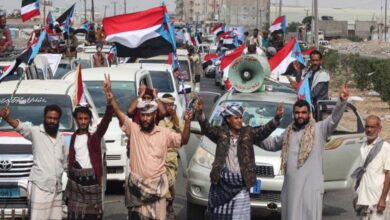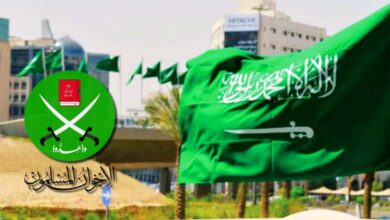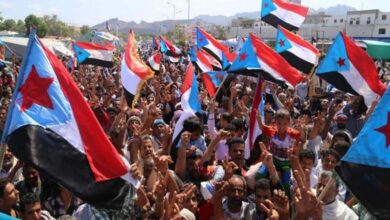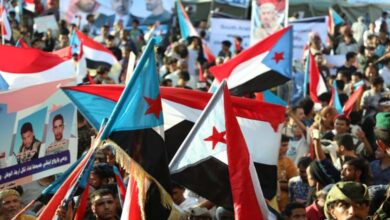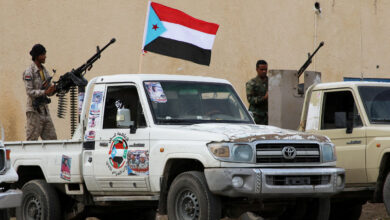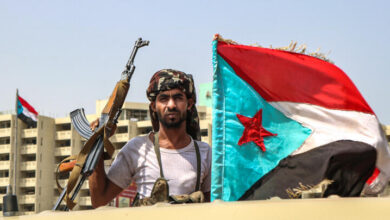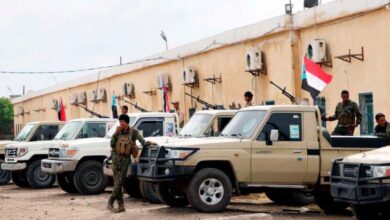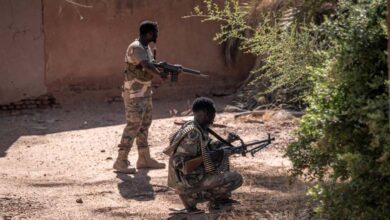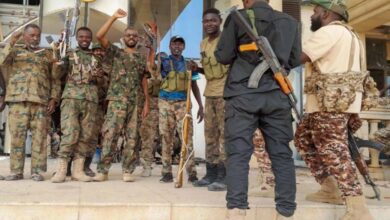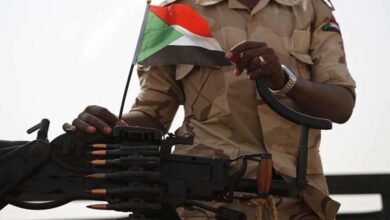Abdul Fattah al-Burhan’s recourse to Iran… the danger of transforming the Sudanese army into a militia similar to the Iraqi ‘Popular Mobilization Forces’
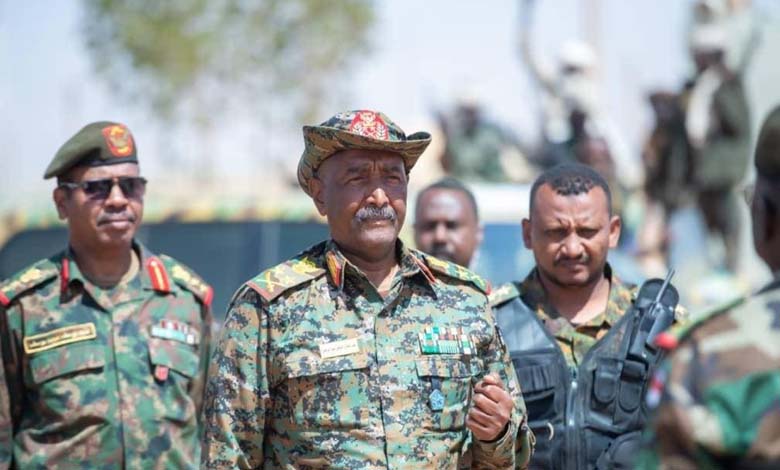
It appears that the escalation of cooperation between Sudan and Iran is raising concerns about the internationalization of the war in Sudan, especially in light of the efforts of some Islamist decision-makers to change the equation on the ground. These parties consider arming as a tactical goal, while their main objective is to internationalize the war in Sudan, threaten the security of the Red Sea, and transform Sudan into a new Iranian base in the region. The United States recognizes the danger of this cooperation and will not tolerate any alliance between Sudan and Iran, especially since Iranian interests in Sudan will be similar to its relationships in Yemen, Lebanon, Iraq, and Syria.
The recourse of Sudanese Army Commander Abdul Fattah al-Burhan to Iran raises fears of transforming the Sudanese army, with its Islamic identity, into a militia group similar to the Iraqi “Popular Mobilization Forces,” obedient to Iran internally and externally as the source of funding and military support.
According to Arij El-Hajj, a researcher in international relations and national security, in a report published by the Washington Institute, after the circulation of a video showing elements of the Rapid Support Forces carrying debris from an Iranian-made drone, concerns have arisen about the return of the former Sudanese regime with all its details to the Sudanese scene, along with yesterday’s allies who contributed to Sudan’s international isolation and its placement on the United Nations and international sanctions lists for three decades.
Bloomberg reported that Iran is supplying the Sudanese army with shipments of Iranian weapons and drones of the “Mohajer 6” model manufactured in Iran, indicating Iranian interest in Sudan. With Sudan’s maritime borders extending to about 670 kilometers, and with control over Sudanese ports, Iran and its allies would gain a foothold in a strategically important trade route near Yemen, Saudi Arabia, and Israel.
The army relied on new weapons in the battles in Omdurman and Khartoum “in an attempt to change its strategy from defense to offense.”
In a speech delivered to officers and soldiers of the 11th Infantry Division in the city of Khashm el Girba, east of Sudan, al-Burhan called on the army and allied armed movements to carry out a wide-ranging attack against the Rapid Support Forces, with the aim of expelling them from all areas under their control.
In the context of political solutions and negotiations to end the war, al-Burhan emphasized in a speech in Kassala the need for these negotiations to take place within Sudan and cannot be conducted by traveling to meet any external party, referring to an upcoming meeting with the head of the Coordination Committee of Civil Democratic Forces “Tajammul” Abdallah Hamdok.
He said that the initiative of the Intergovernmental Authority on Development (IGAD) does not represent the will of the Sudanese people or interfere with Sudanese affairs. He said, “No external party will impose solutions on us.”
Al-Kizan
With the continuation of the war and no solution in sight, international interventions seeking their interests in Sudan have increased, betting on various factions to gain more influence in a country dominated by turmoil.
The control of the Islamic Movement axis “Al-Kizan” has emerged strongly, especially after the suspension of the Jeddah platform and the halt of negotiations to end the war, and Sudan’s rejection of the IGAD initiative, which it described as “biased towards the Rapid Support Forces and its leader, Lieutenant General Mohamed Hamdan Dagalo.”
Abdul Fattah al-Burhan, who made the eastern part of the country his capital, specifically in Port Sudan on the Red Sea, is accused of being supported by the former regime of Omar al-Bashir and its Islamic leadership, alleging that they are the masterminds of the war.
This group, called “Al-Kizan,” still maintains relations with Iran, with its former leader and mentor, Hassan al-Turabi, being loyal to it.
Historically, strong ties have been established between Sudan’s al-Kizan and other Islamic organizations in the region such as Hamas, Al-Qaeda, and Hezbollah. Previously, the relationship between Iran and Sudan was close, as Sudan was under the rule of the Sudanese Islamic Movement, led by al-Turabi and President al-Bashir since 1989. This relationship continued until January 2016 when it was publicly severed due to the storming of the Saudi Embassy in Tehran.
Now, after the settlement between Riyadh and Tehran, these tensions have subsided, and relations based on mutual interests between Iran and its traditional partners in Sudan have resumed.
In fact, the possibility of continuing this relationship unofficially persists even during times of tension, as many individuals involved in the Islamic Movement have contacts outside Sudan, including with Qatar and Iran, even during periods of strained relations between Tehran and Khartoum.
Recently, Egyptian authorities arrested businessman Abdelbasset Hamza in Cairo, who was close to former Sudanese President Omar al-Bashir and his party.
The US Department of State has classified Hamza as a global terrorist, indicating that he has provided financial support to Hamas amounting to approximately $20 million, suggesting that Sudan’s ties with foreign armed groups have not been completely severed.
In a move seen by many as a revival of old relations, a statement was issued by the Sudanese government in October 2023 stating that the two states, Iran and Sudan, “discussed the restoration of bilateral relations between them, and speeding up steps to reopen their embassies,” with media reports suggesting that “Tehran received a promise from figures affiliated with the Islamic Movement to cooperate with it and facilitate extending its influence in the Red Sea if it provides generous military support to the army to help it withstand in the war.”
What makes the future in this situation even more ominous is Sudan’s history of harboring extremists and jihadists from the far right to the far left. During the era of the previous regime, Sudan hosted figures such as Osama bin Laden, leader of Al-Qaeda, and Carlos the Jackal, affiliated with Hezbollah, which led to Sudan being placed on the list of countries supporting terrorism.
By comparing scenarios in the region and other areas where Iranian influence has expanded, concerns are mounting, especially after calls from the Sudanese army to arm citizens and organize them for “popular resistance,” opening up avenues for individuals to purchase weapons.
The Bija Tribes
The stronghold of the Sudanese army in the east is considered the most vulnerable area to Iranian expansion. The presence of the Bija and their support for the Islamic movement and the army are among the prominent factors that make Port Sudan a comfortable place and a good starting point for controlling the port. The head of the High Council for Bija Tribes and Independent Verticals, Mohammed Al-Amin Turk, is a member of the National Congress Party and the Islamic movement, and he is currently one of the supporters of the Sudanese army and Lieutenant General Abdul Fattah Al-Burhan.
The Bija tribes in eastern Sudan, under the rule of the ousted President Omar Al-Bashir, faced neglect and disregard for their legitimate demands, such as economic reform and achieving political representation in the eastern region. This turned into a prominent challenge facing the transitional government after the overthrow of Al-Bashir, even before the conflict between the army and the Rapid Support Forces erupted, as the tribes once again affirmed their lack of effective representation in transitional governance institutions.
Mohammed Al-Amin Turk, head of the “High Council for Bija Tribes and Verticals,” led a number of eastern Sudanese tribes that reject the peace process in the Juba Agreement, which was concluded between the former transitional government and armed movements.
The rejection was due to their marginalization and the selection of parties that do not represent the region for negotiation. These tribes have threatened to establish a Bija state in the east, with the Council announcing its intention to “declare the Bija state,” accompanied by a new timetable for closing a trial in the eastern part of the country.
The conflict between the east and the center has escalated more than once with the closure of the Port Sudan port and the road to Khartoum. The Council closed the port in September 2022 in protest against the signing of the “Framework Agreement,” supported internationally between the Central Council for Freedom and Change “Forces for Freedom and Change” and the military component, accusing the government of misrepresentation and neglect of their demands.
In addition to the Bija, there are a group of military brigades affiliated with the army with an Islamic character. For example, the Special Operations Forces, which are part of the army, consisting of intelligence, shock, and special forces units, and active Islamic blocs in areas such as Kassala State and Khartoum, where they post pictures on social media showing their presence in Omdurman and pictures of their operations in Shendi north of Khartoum.
Several brigades, such as the Sudanese Popular Resistance in the Red Sea State, participate in the political momentum that brings together military and political leaders with the same Islamic interest.
They emphasize the readiness of reserve and mobilized forces to work in various areas, with a focus on protecting the eastern gate.
Whether Sudan’s situation is a repeat of scenarios that have occurred in the region or a different scenario from its predecessors, it is important to know that the presence of extremist military groups in Sudan and their enhanced status will not stop their impact within the borders but will be a point from which the surrounding areas will be affected.


